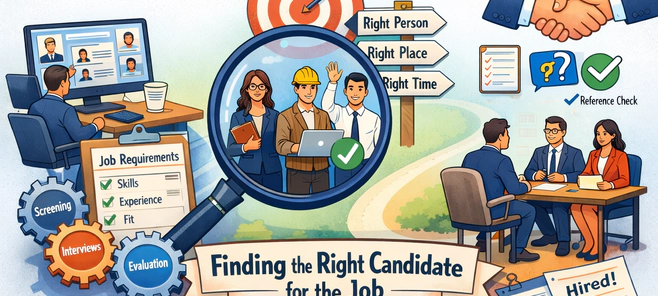We all want to land our dream job, but it’s rarely possible to start with the perfect role or a high-paying position. Most of us begin with an entry-level job. To achieve our dream job, we have to acquire different types of skills. These skills will prepare us for a job with a competitive salary or benefits. Entry-level jobs provide us with the opportunity. Most successful people started with entry-level jobs, like field jobs or part-time remote jobs. Let’s explore different thoughts and strategies regarding entry-level jobs.
Let’s Know About Entry-Level Jobs
There are a lot of misconceptions we have regarding entry-level jobs. Some people think it is not a formal job, some think they have gained a lot of skills or graduated from college, so why should they start from the entry level! These thoughts come from a lack of knowledge; we don’t know the details about these jobs. Let’s go deep down.
Types of Entry-Level Jobs
Normally, those jobs do not require a lot of experience or skills. The salary can be low; we can call these entry-level jobs. Though sometimes the salary is low, there is a huge opportunity for skill and professional growth. Remember, future success depends on how powerful your foundation is. Let’s try to explore some entry-level jobs.
Formal Entry-Level Jobs
These are jobs with a formal structure, such as official registration, clear work environments, and established procedures. Normally, formal jobs are official jobs. Employees can have an agreement. Junior executive, operator, trainee, assistant, etc. A paid internship can also be called an entry-level position. Sometimes these jobs need hard-working effort, but they provide us with a professional or corporate culture and a vast area of knowledge. Many people shy away from hard work or entry-level roles, but you can’t expect a six-figure salary right from the start. Most CEOs, marketing executives, and heads of sales began their careers in field sales.
Informal Entry-Level Jobs
There are a lot of jobs that are not structured; these types of jobs are not under registration, there is no structured salary, payment, or future safety, and also a lack of contracts. Sometimes, educated freshers think entry-level jobs mean only informal-type jobs. This is not right. They also think it means regular labour-related work, but nowadays, freelance and creative sector jobs are the most attractive jobs in the informal sector. Those who have lower educational skills but want to do something can start daily labour-type or technical-type work. Remember, if you can learn high skills or gain knowledge through these types of jobs, you can convert them into a business or entrepreneurship model. So if you don’t have the opportunity to do something better, start with what you have; it’s better to start something than to be stopped.
Part-Time Jobs
Sometimes we fail to gain a full-time job, but if we try, we can start with part-time remote jobs. These part-time jobs also help us add something to our résumés. It can be a good strategy for university students, and many of them do it, which enriches their résumés. Sometimes dual part-time remote jobs help us financially at the entry level.
Work From Home
There are some entry-level openings designed to work from home jobs. A lot of candidates or job seekers ignore work from home jobs or hybrid jobs on job search sites, but nowadays, these types of work-from-home jobs are among the highest paying jobs today. This is also an informal type of work, but if you have creativity or IT/creative sector-related knowledge, you can beat the battle.
Internship or Apprenticeship
A lot of job seekers ignore internship opportunities. But it’s a great opportunity to prove yourself. If we can show minimum performance, it can reflect a big image. Most organizations provide job opportunities after completing internships. Sometimes, similar industries retain those interns as assets for their company. So try to find out this type of opportunity which also helps to enrich your resume.
Why Entry-Level Jobs Are Important
A lot of people have high ambitions. Some want to be CEOs of multinational companies, some want to be great entrepreneurs. Whatever you want to be, you need to know the basic task knowledge. What struggles or challenges middle and lower-level workers are facing - if you don’t understand, you cannot manage any organization.
Entry-level jobs give you experience in different departments. From different types of bosses, you can learn different leadership and crisis management styles which make you mature.
Nowadays, there is a trend across the world: every young generation wants to be an entrepreneur and start a startup. But research shows that 80-90% of startups fail. Because the founders only focus on the product, services, or profits. But managing a business or organization is more difficult. For a managerial position, we need fundamental knowledge of accounts, finance, HR, and other departmental activities. If you have proper experience, then you can provide solutions. Your low-paying or starting jobs provide this million-dollar experience.
Besides, if you want to start a business, try to get involved or find an entry-level job on job search sites. Find jobs in similar industries, services, or products - it will help you gain deeper ideas.
Common Sources
Job Portals
Job portals are the easiest sources for entry-level jobs. Organizations also prefer them. If you want to start your job, find jobs that don’t have many requirements. There are millions of jobs without experience or high skills. Properly follow the instructions and apply.
Organization Websites
Most organizations nowadays provide job opportunities in their career segments. Organizations that run retail or distribution businesses regularly circulate sales-related jobs. Sales and Marketing can be a good start for future growth.
LinkedIn
LinkedIn is a vast platform for finding your preferred sector job. But you have to regularly follow preferred industries, organizations, and professionals.
Job Fair
For freshers or persons with low experience, companies offer walk-in interviews or instant joining opportunities. These prioritize field-related skills and interests.
Factory or Organization Boards
We don’t usually explore this. Almost every organization provides its circular in its building. With minimum technical knowledge, you can start a job in a factory. It is hard work and struggling, but it helps you in your future battle.
Others
A job isn’t a ready product that you can just buy or grab. It requires proper time, effort, and strategy. We have to knock on every possible door. We have a lot of friends or family members - we can show interest and seriousness to them; they can refer us to their present companies. Also, there are some seasonal businesses. In peak seasons, some offices post huge circulars. Be patient, try, and follow organizations. Submit your Resume. Don’t miss internship opportunities. Sometimes, 6-month internships or apprenticeship opportunities provide you with extensive experience that you cannot buy with money.
Strategy
There are a lot of equations to get a job - the same goes for entry-level jobs. Recruiters’ expectations and applicants’ skills should align at a common point. There are a lot of experienced people who compete with freshers. So we need a proper strategy to enter an entry-level position.
Analyze Personal Skills
A job is not an open choice. I may have an interest in a sector, but that doesn’t mean I will get the job. I have to be skilled in that sector. So first of all, find out your own skills. It can be hard and soft skills. Besides this, sometimes we don’t know that we have a lot of qualities that can be converted into skills. Suppose you are an extroverted person - it can be converted into communication skills with proper nurture. So, list down every single skill.
Select Your Interested Sector/Industries
Sometimes we know our interested job position, but we don’t know much more. Like, we want to be a salesperson, but we don’t know which industry. Industry-wise, work culture, job duty, task, responsibility, salary, growth, and requirements - everything is different. A salesperson who sells laptops or tech products and one who sells medicine - both roles are hugely different. So find out your preferred industry aligned with your skills.
Primarily, Select Your Preferred Job Position
Most of the time, we have a dream in a specific industry, but we don’t know about the industry culture, work type, growth type, and entry-level positions. We can find specific position names from job portals, the internet, or company websites.
Review Job Details
We have primarily selected our preferred industry and positions. Now we have to understand the nature. Find the details from the job site search. Review requirements, job responsibilities, tasks, and every detail.
Prepare Resume
It’s time to build a Resume. You’ve found out the major details - now prepare different CVs or resumes for different requirements. Remember, position names can be the same, but organization-wise, job nature can be different. So prepare or build your résumé with specific requirements. Most job seekers submit a common resume for every job. But every job has a different objective and different specific skills to highlight.
Properly Submit Your Job Application
Most job seekers don’t prioritize the job submission procedure. It is very important. Some organizations collect only a Resume through email, some require a cover letter. Most organizations nowadays collect job information through their own portals. Sometimes applicants don’t fill out the form properly; that’s why they are not counted by the system. So submit the application with full effort.
Written Exam or Interview Preparation
Different jobs have different types of recruitment procedures. So if your preferred job requires a written exam, try to find out previous question patterns. You can try AI for sample practice. The same goes for interview preparation - practice yourself and be prepared.
Keep Trying
It can happen that you don’t get an interview call. Don’t be disappointed. Keep updating your resume, and follow the process. Try to get a part-time/remote/hybrid job - don’t waste time waiting for a high-paying job.
Starting Is Essential
Entry-level jobs might not always be flashy, but they’re the foundation that helps you build valuable skills and the right mindset for success. Start checking out opportunities today through job search websites or by asking for referrals, and take the first step on your journey.






